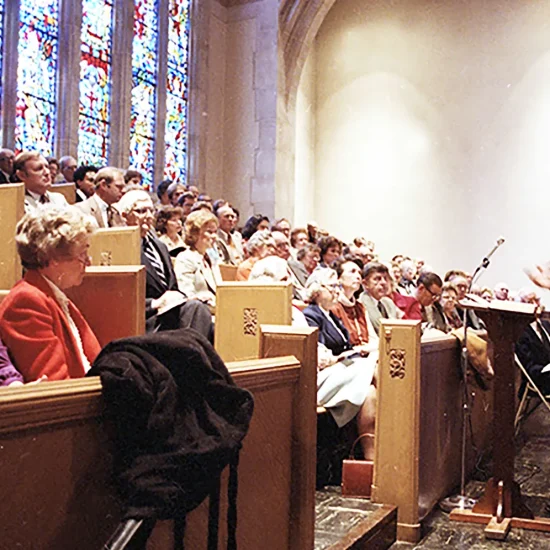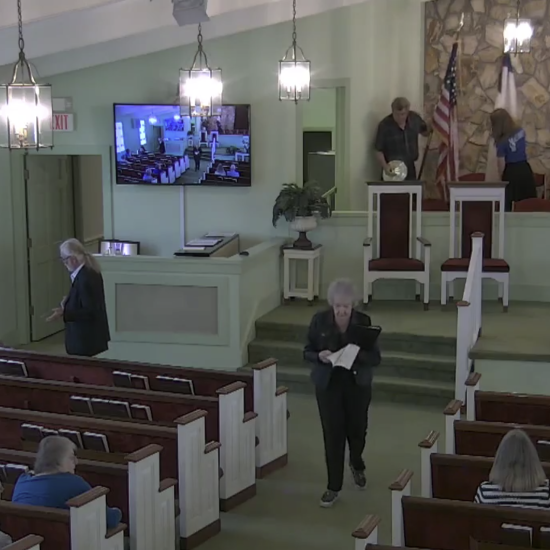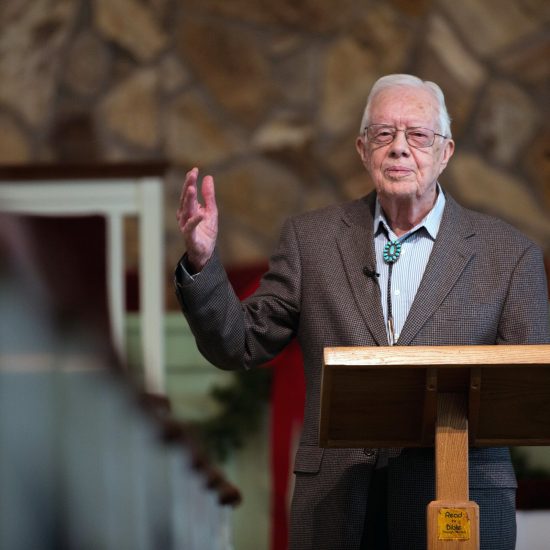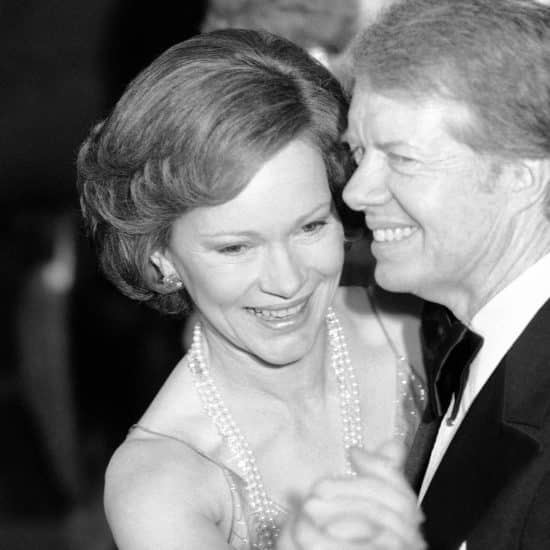(The Conversation) — Nearly 40 years ago, on July 15, 1979, President Jimmy Carter went on national television to share with millions of Americans his diagnosis of a nation in crisis. “All the legislation in the world,” he proclaimed, “can’t fix what’s wrong with America.” He went on to call upon American citizens to reflect on the meaning and purpose of their lives together.
Carter made several specific policy prescriptions. But in a presidency animated by spirituality perhaps more than any other in American history, this speech called more generally for national self-sacrifice and humility.
At a time when political strongmen, hypernationalism, and xenophobia have risen in the U.S. and the world, Carter’s speech offers a powerful counterexample to these trends.
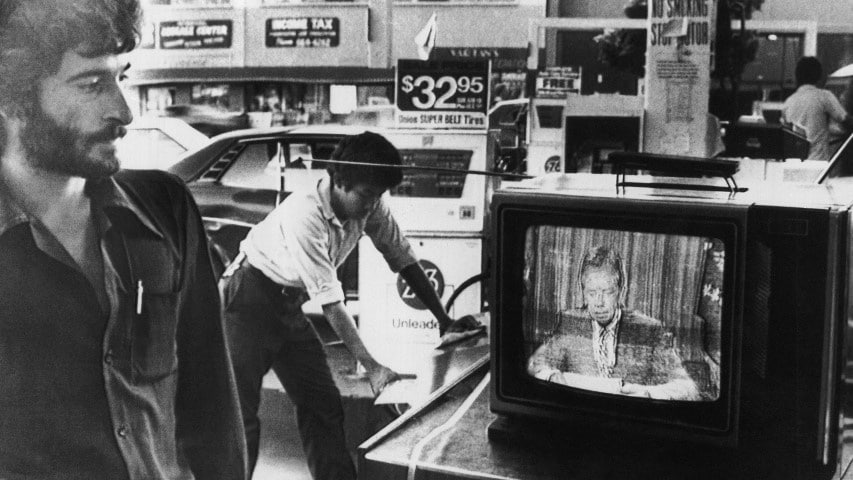 Rami, a gas station manager, watches President Jimmy Carter giving his energy speech over national television, July 15, 1979, in Los Angeles. (AP Photo/Mao)A nation in “very serious trouble”
Rami, a gas station manager, watches President Jimmy Carter giving his energy speech over national television, July 15, 1979, in Los Angeles. (AP Photo/Mao)A nation in “very serious trouble”
In 1979, Jimmy Carter was three years into his presidency. The burdens were many. Leading a divided Democratic Party, he faced a staunch and growing Republican opposition. The nation suffered from stagflation, a combination of economic stagnation and 12 percent inflation.
In 1973 the OPEC cartel, comprised mostly of Middle Eastern countries, had cut oil production and imposed an embargo against nations that supported Israel. In the late 1970s production declined again. Coupled with high global demand, this generated an energy crisis that increased gasoline prices by 55 percent in the first half of 1979.
In protest, truckers set bonfires in Pennsylvania, and Carter’s approval rating sank to 30 percent. An anxious Carter cut short his overseas trip to Vienna where he was holding nuclear-arms talks with the Soviet Union’s Leonid Brezhnev.
After a brief stop in Washington, the President retreated to Camp David for 10 days. As he considered the severe and interlocking problems facing his administration, Carter read the Bible, historian Christopher Lasch’s The Culture of Narcissism, and economist E.F. Schumacher’s Small Is Beautiful, a meditation on the value of local community and the problems of excessive consumption.
He also invited representatives from many sectors of American life – business and labor leaders, teachers and preachers, and politicians and intellectuals – to consult with him. By the end of his retreat, Carter had concluded that the country faced more than a series of isolated problems. Collectively they comprised a fundamental cultural crisis.
The malaise speech
Having cloistered himself for an unprecedented length of time, the President emerged from Camp David with great drama on July 15, 1979. In a nationally televised speech that was watched by 65 million Americans, Carter intoned an evangelical-sounding lament about “a crisis of the American spirit.”
He said, “In a nation that was proud of hard work, strong families, close-knit communities and our faith in God, too many of us now worship self-indulgence and consumption.”
Indeed, the President’s sermon expounded at length about excess. “Human identity is no longer defined by what one does but by what one owns,” he preached. But “owning things and consuming things does not satisfy our longing for meaning.”
It was a penetrating cultural critique that reflected Carter’s spiritual values. Like the writers of the New Testament, he called out sin. Like the prophets of the Old Testament, he confessed to personal and national pride.
In the mode of theologian Reinhold Niebuhr, he noted the limits of human power and righteousness. In this moment of national chastening, he committed himself and the nation to rebirth and renewal.
As a scholar of American religious history, this so-called “malaise speech” (though Carter never actually used the word “malaise”) was, in my opinion, the most theologically profound speech by an American president since Lincoln’s Second Inaugural Address.
A squandered opportunity
This articulation of economic and political humility sounded the perfect pitch for a nation whose confidence in civil institutions had been shaken. The Watergate scandal had revealed corruption in the nation’s highest political offices. The Vietnam War had ended with a Communist victory.
The “malaise speech” was a continuation of a long-running theme for Carter. In his 1977 inaugural address, he intoned, “We have learned that ‘more’ is not necessarily ‘better,’ that even our great nation has its recognized limits, and that we can neither answer all questions nor solve all problems … we must simply do our best.”
Popular memory suggests that the nation reacted negatively to his speech. In The Age of Reagan, historian Sean Wilentz writes that Carter appeared to be blaming the American citizens for their problems. Others panned Carter’s idealistic approach to the energy crisis as naïve.
But that was not how most Americans received the speech. In fact, Carter enjoyed an immediate 11 percent bump in his job approval rating in the days that followed. Clearly many agreed with Carter’s line that the nation was mired in a “moral and spiritual crisis.”
The President, however, failed to capitalize on the resonance with his meditation. Just two days after his speech, Carter fired his entire cabinet, which seemed to suggest that his government was in disarray.
The President’s poll numbers immediately melted. As Time magazine described it, “The President basked in the applause for a day and then set in motion his astounding purge, undoing much of the good he had done himself.” Reagan soon capitalized on the disillusionment. “I find no national malaise,” said Carter’s successor, who campaigned on a platform of America as “a shining city on a hill.
About to win the Cold War, America was ready for some exuberant nationalism, not a plain-style president who insisted on carrying his own garment bag aboard Air Force One.
New resonance
Forty years later, national jingoism pervades both political parties. Republicans and Democrats alike speak of the United States as a “city on a hill,” and Donald Trump’s “America first” rhetoric has lifted hubris to new heights and alienated allies around the world.
Jimmy Carter’s sermon of humility speaks more than ever to crises of our times.
David Swartz is associate Professor of History at Asbury University. This article was originally published on The Conversation.

